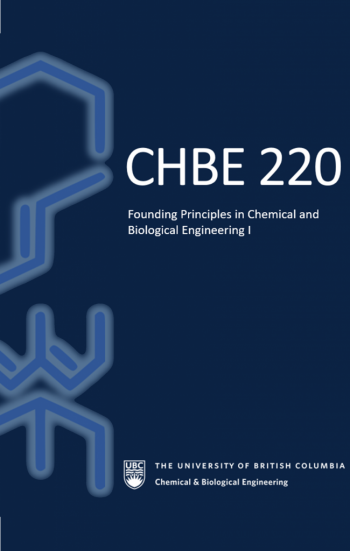Jonathan Verret received a 2019/20 OER Implementation Grant for a project that resulted in the creation of a “Foundations of Chemical and Biological Engineering” open textbook. This resource, which provides an introduction to foundational topics of chemical engineering, is used in UBC’s CHBE 220 “Founding Principles in Chemical and Biological Engineering I” course. Previously, this course used a variety of textbooks– including some which students had to purchase– to cover all topics in the program. Here, Dr. Verrett describes how OERs help support student learning by ensuring free access to all course resources.

https://pressbooks.bccampus.ca/chbe220/
You received an OER Implementation Grant for your proposal to adopt interactive learning resources –in an introductory chemical engineering design course. What motivated you to apply for an OER Fund grant?
The course we targeted has been running for a year as part of both “Chemical Engineering” and “Chemical and Biological Engineering” undergraduate programs. I wanted to develop open resources to assist students because there was no one particular textbook that covered all the subjects in the course. The OER Fund also allowed me to include two students in creating these resources. One of them had taken the first iteration of the course, and the other was a year ahead in the program but had not taken the new course. This combination worked out quite well, as both students came to the project with different experiences. We discussed the best strategies for assisting students in their learning.
How do students benefit from your project?
Students now have a dedicated resource they can use to support their learning in the course. Like a conventional textbook it contains explanations as well as practice problems to help test their understanding. This resource is hosted on Pressbooks, an open book creation platform. Students can view it there as a web page, or download it in a variety of formats such as PDF or ePub. I was already using WeBWorK, an open homework system, in the course ; this open resource supports that as well.
How does the use of open resources support your teaching and learning goals?
With open resources, I can be assured that all students in my course have access the resources to support their learning. Overall, this sets them up well for the CHBE 2020 course and the courses that build on it. Students can also refer back to these resources later on if they want to review or practice a concept.
How did you develop your open resources? Any tips for other instructors?
We started by looking at what already existed. Since our course focuses on physical chemistry, we adapted material from existing OERs in that area. For about half of the sections we wrote, we found some open materials we could take inspiration from. In areas where we could not find existing open resources, we created materials from scratch.
What support was useful in helping to develop this OER?
The UBC Library and copyright support was very valuable. We engaged with folks from the library a lot initially to assess existing resources. They also provided guidelines regarding what could be done and what should be avoided to ensure our resource could be published under an open license.
Why do you think it is important for instructors to consider using or creating open educational resources?
At a public institution, I think it is important to ensure access to educational materials as well as to license them for public use. Particularly in fields such as engineering, fundamental courses tend to not change very much, so it can be very useful to create and use these resources for a number of years.
The Foundations of Chemical and Biological Engineering I Open Textbook can be accessed at https://pressbooks.bccampus.ca/chbe220/.
Dr. Jonathan Verrett is an Associate Professor of Teaching in the Department of Chemical and Biological Engineering at UBC.
Learn more about the OER Fund at https://oerfund.open.ubc.ca/.
